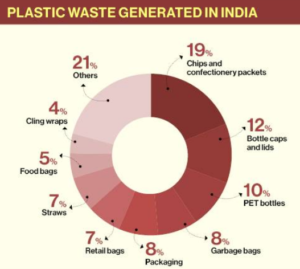In news
Vice President India calls for mass media campaign to educate people on single use plastics
What is single-use plastic?
- Single-use plastics are disposable plastics meant for use-and-throw.
- These comprise polythene bags, plastic drinking bottles, plastic bottle caps, food wrappers, plastic sachets, plastic wrappers, straws, stirrers and Styrofoam cups or plates.
- It is harmful to the environment as it is non-biodegradable.
- Single-use plastics slowly and gradually break down into smaller pieces of plastic known as micro plastics.
- It can take thousands of years for plastic bags to decompose, thus contaminating soil and water in the process.
- The noxious chemicals used to produce plastic get transmitted to animal tissue, and finally enter the human food chain.
- Fish consume thousands of tons of plastic in a year, ultimately transferring it up the food chain to marine mammals.
Environmental effects of single use plastic
- While it is still unclear, some studies suggest that plastic bags and Styrofoam containers can take up to thousands of years to decompose, contaminating soil and water, and posing significant ingestion, choking and entanglement hazards to wildlife on land and in the ocean.
- Due to their light weight and balloon-shaped design, plastic bags are easily blown in the air, eventually ending up on land and in the ocean.
- Plastic bags can choke waterways and exacerbate natural disasters.
- In 1988, poor drainage resulting from plastic bag litter clogging drains contributed to devastating floods in Bangladesh, causing several deaths as two-thirds of the country was submerged
Ban on single use plastics in India
- The Government of India has held off imposing a blanket ban on single-use plastics to combat pollution a measure seen as too disruptive for industry at a time when it is coping with an economic slowdown and job losses.
- The plan was part of a broader campaign to rid India of single-use plastics by 2022.

- It was mentioned that there would be no immediate move to ban plastic bags, cups, plates, small bottles, straws and certain types of sachets and instead the government would try to curb their use.
- For now, the government will ask states to enforce existing rules against storing, manufacturing and using some single-use plastic products such as polythene bags and styrofoam, the officials of the Ministry of Environment told
- There was a conscious decision within the government not to hit businesses hard for now and discourage the use of plastic only on a voluntary basis,” said an official working on policy.
State-wise plastic ban(2019)
- According to CPCB, eighteen States have imposed a complete ban on plastic carry bags and products.
- Besides, five States namely Andhra Pradesh, Gujarat, Jammu and Kashmir, Kerala and West Bengal have imposed the partial ban on plastic carry bags and products at religious and historical places
- As per the CPCB, the seven States where a partial ban was imposed are Assam, Bihar, Manipur, Meghalaya, Telangana and UTs of Goa and Pondicherry.
Alternative to plastic
- Bioplastics: Made from algae, waste agricultural and food residues, using bacteria or mushrooms as micro-converter
- Some bioplastics like PHAs (polyhydroxyalkanoates) are soil- and marine-safe — that is, they safely degrade in the environment within weeks or months, leaving no harmful residues.
- Water dispensers & ‘water ATMs’: They can replace packaged plastic bottled water in most locations.
- Finally, where single-use plastic cannot be avoided, a plethora of technologies can help recover and sort the waste. Examples are smart bins, sorting machines, reverse vending machines and smart packaging technologies that make it easier to separate different materials.
















